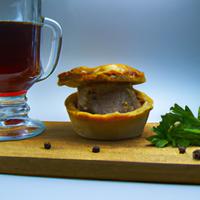
1 serving (100 grams) contains 300 calories, 10.0 grams of protein, 20.0 grams of fat, and 25.0 grams of carbohydrates.

Log this food in SnapCalorie

Nutrition Information
Calories |
714.3 | ||
|---|---|---|---|
% Daily Value* |
|||
| Total Fat | 47.6 g | 61% | |
| Saturated Fat | 19.0 g | 95% | |
| Polyunsaturated Fat | 0 g | ||
| Cholesterol | 119.0 mg | 39% | |
| Sodium | 1190.5 mg | 51% | |
| Total Carbohydrates | 59.5 g | 21% | |
| Dietary Fiber | 2.4 g | 8% | |
| Sugars | 4.8 g | ||
| protein | 23.8 g | 47% | |
| Vitamin D | 0 mcg | 0% | |
| Calcium | 47.6 mg | 3% | |
| Iron | 2.4 mg | 13% | |
| Potassium | 357.1 mg | 7% | |
* Percent Daily Values are based on a 2,000 calorie diet. Your daily values may be higher or lower depending on your calorie needs.
Food Attributes
Source of Calories
About Small pork pie
Small Pork Pie is a traditional British savory pastry, popular as a snack or picnic treat. It typically consists of a filling made from seasoned minced or diced pork, encased in a golden, crispy hot water crust pastry. The pork mixture is often encased with a layer of gelatin, which helps preserve freshness and adds moisture. Originating from English cuisine, pork pies are associated with regions like Melton Mowbray, renowned for their rich history of pie-making. While they are undeniably flavorful and indulgent, pork pies are also high in saturated fat, cholesterol, and calories due to the fatty meat and pastry. These aspects make it a less healthy option for regular consumption. However, it does provide protein from the pork, which can be beneficial in moderation when balanced with healthier meal choices. Enjoyed occasionally, it remains a hearty nod to classic British culinary traditions.



